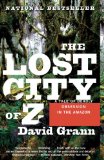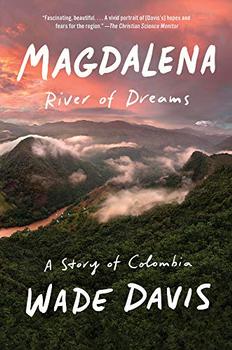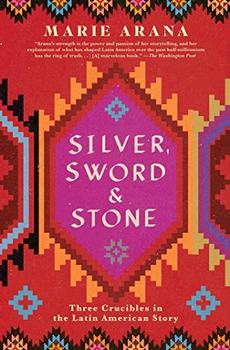Summary | Excerpt | Reviews | Beyond the book | Read-Alikes | Genres & Themes | Author Bio

A Tale of Deadly Obsession in the Amazon
by David GrannI liked precisely half of this book. David Grann chose to structure The
Lost City of Z as two stories interleaved with one another, the even
chapters devoted to one story and the odd chapters jumping over to the other.
This is not an uncommon strategy and it can work beautifully—think Erik Larson's
Devil in the White City or Anne Fadiman's
The Spirit Catches You and Then You Fall Down—but it does have a
built-in risk, namely that the reader will find herself drawn more to one story
than the other, skimming every other chapter in her eagerness to get to the good
stuff. And that's how I experienced this book.
The first, more conventional story is an engrossing, well-paced narrative
history of Colonel Percy Fawcett's obsession with finding an ancient, lost city
in the uncharted jungle of the Amazon. Fawcett's story is the kind of juicy
history that is so fantastic it would never work as fiction. Fawcett's
expeditions were unbelievably treacherous and miserable, and they held the
promise of so little reward. The kind of man who would embark on them must have
been driven by something rare indeed.
Grann does an excellent job of bringing Fawcett's exceptionality to life. All of
the other men in his expeditions suffered untold hardships from jungle life,
from malaria to espundia (a parasitic disease that dissolves the flesh around
the mouth, nose, and limbs), to maggots growing just under the surface of their
skin. Think about that for a second. Grann writes that when the biologist James
Murray contracted maggots, they "grew as long as an inch, and occasionally poked
out their heads from his body, like a periscope on a submarine. It was as if his
body were being taken over by the kind of tiny creatures he had studied." Yet
Fawcett always remained untouched. He was never injured, never bitten, never
infected. It was as if he were designed for some higher purpose, custom
engineered to slip through the jungle and see what mere white mortals could not.
The author is liberal with the gory details, which repulsed me and fascinated me
in exactly equal proportions. Those are the passages I read aloud to my husband,
much to his chagrin. But I also appreciated Grann's attention to the less
sensationalist sides of Fawcett's quests, like his studious training at the
Royal Geographical Society and his relatively unracist ways of approaching
Indians hostile to invading white men. Fawcett's tale, which was new to me, is
apparently a story that has been told many times, but Grann conducted original
research in archives around the world, uncovering previously private material
which adds new depth to the tale.
But that's where the book lost me. The second dimension of Grann's narrative is
the story of his own quest for clues about Fawcett's whereabouts, first in
archives and then in the jungle, which he tells in the first person and strings
out suspensefully like a detective story. This too is a risky authorial strategy
which depends on cultivating the reader's trust, either through an utterly
beguiling narrative voice, as in Lawrence Wechsler's
Mr. Wilson's Cabinet of Wonders or Michael Paterniti's
Driving Mr. Albert, or through the authority of one's expertise, as in
Seth Shulman's
The Telephone Gambit. But Grann's voice is flat and uncompelling, and
his depiction of his chase after Fawcett raised far more questions in my mind
than it answered.
He plays the role of a naïf whose purity of motive opens doors to the Fawcett
mystery. For instance, he emphasizes how unfit for the jungle he is ("I have a
terrible sense of direction and tend to forget where I am on the subway and miss
my stop in Brooklyn"), contrasting starkly with Fawcett and his fearsome
competency. Yet he also asks us to trust him as he outfits himself at an outdoor
store, flies to Brazil, hires a guide, and penetrates the jungle, with nary a
hitch (or a maggot). He contacts one of Fawcett's granddaughters who hesitates,
but then hands over Fawcett's logbooks and diaries, something few outsiders have
seen. He contacts a reclusive anthropologist working in the Amazon, someone who
won't take calls from his own best man, but who talks to Grann by satellite
phone and invites him to the native village where he is working. Grann has too
many breakthroughs that seem too unearned, so when he gets to the end of his own
heroic quest (which I won't spoil by discussing here), his final, glorious
epiphany in the jungle left me feeling manipulated. It's hard not to draw the
conclusion that Grann has massaged the timeline of his various discoveries in
the interest of a blockbuster story.
Ultimately, Grann's strategy doesn't pay off, and it doesn't elevate the book
into something more than its subject matter. I will highly recommend this book
to anyone I know with an interest in exploration. But this is not a book, like
Daniel Everett's
Don't Sleep, There are Snakes, that I'll push on everyone I know,
whether or not they have an interest in the Amazon. Grann got me interested in
Fawcett, but not obsessed. Given the maggots, that's probably a good thing.
Photo: Colonel Percy Fawcett, born 1867
![]() This review was originally published in The BookBrowse Review in March 2009, and has been updated for the
February 2010 edition.
Click here to go to this issue.
This review was originally published in The BookBrowse Review in March 2009, and has been updated for the
February 2010 edition.
Click here to go to this issue.

If you liked The Lost City of Z, try these:

by Wade Davis
Published 2021
A captivating new book from Wade Davis--award-winning, best-selling author and National Geographic Explorer-in-Residence for more than a decade--that brings vividly to life the story of the great Río Magdalena, illuminating Colombia's complex past, present, and future.

by Marie Arana
Published 2020
Against the background of a thousand years of vivid history, acclaimed writer Marie Arana tells the timely and timeless stories of three contemporary Latin Americans whose lives represent three driving forces that have shaped the character of the region: exploitation (silver), violence (sword), and religion (stone).
Your guide toexceptional books
BookBrowse seeks out and recommends the best in contemporary fiction and nonfiction—books that not only engage and entertain but also deepen our understanding of ourselves and the world around us.